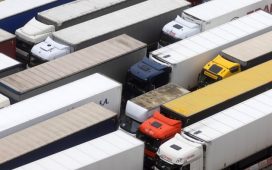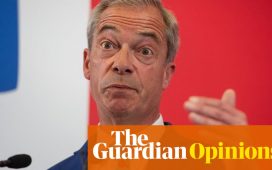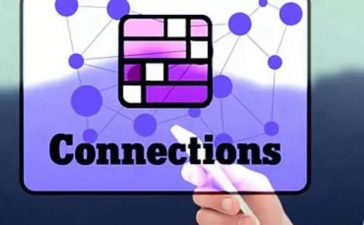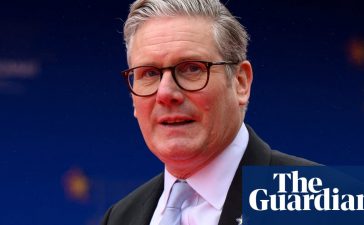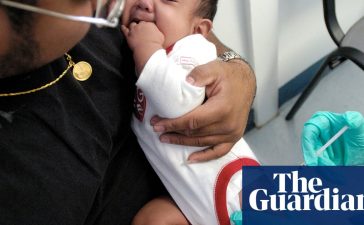Zelenskiy meets business leaders at Davos
The mood in the room here where Ukrainian president Volodymyr Zelenskiy met with business leaders this morning was “upbeat, determined, positive,” US senator for Delaware, Chris Coons, tells us.
Coons was one of an estimated 50 or more people who met with Ukraine’s leader today, as Zelenskiy pressed attendees at Davos for their support in the ongoing war with Russia.
Coons, who sports a badge with both the US and Ukrainian flags linked, explains that the meeting went “very well, it was very encouraging”, and that it was an expression of business and national support for Ukraine.
Zelenskiy gave us an update on the war with Russia, and the determination of the Ukrainian people,” Coons explains, adding:
“He urged that we remain as determined as the Ukranian people and that we see this through.”
There were a number of bankers in the room (including Bank of America’s Brian Moynihan), and also the head of fertilizer giant Yara, Coons tells us.
Senator Coons adds that Youtube’s CEO talked about the efforts they have made to take down Russian disinformation and malign content and to make sure that students are able to learn, businesses can communicate, and government can function.
Ursula von der Leyen made “forceful remarks” about her six visits to Kviv during the war, how impressed she is with their reform movements to combat corruption, to improve transparency to create a good business environment.
Attendees also heard from Jens Stoltenburg, the head of Nato, about about the status of the war, and some of the crucial progress in the Black Sea, the challenges of the spring and summer offensive.
Stoltenburg encouraged everyone to remain committed and determined, Coons says.
Penny Pritzker, the US special representative for Ukraine economic recovery, told the meeting about how she recently took a group of US business representatives to Kyiv to see for themselves the possibilities.
Coons, who sat next to Germany’s economy minister Robert Habeck, was also complimentary about Ukraine, telling us:
I spoke about how in my own manufacturing business, we used to say ‘hire for attitude, train for skill’.
The Ukrainian people have shown they have both – ferocious determination, a great attitude, a work ethic and determination, and very good skills, technical ability and agility, engineering skills, the capacity to find a way even when desperately outgunned and outmanned by a much bigger force.
That’s a great place to invest.
I spoke about the Marshall Plan, and how it wasn’t charity, it was in America’s own security and economic interest.
One European banker pointed out that while the Marshall Plan was a great thing, it took America several years after the end of the war to actually offer the help.
Coons argues the process can start even before the war is over, in parts of the country less affected by the conflict which are stable and secure.
He says:
Here we need to begin now, we need to now wait until it is fully, finally over?
On funding, Coons told the meeting with confidence that United States will deliver the $61bn which is in President Biden’s supplemental funding request.
Coons, a key Biden ally, tells us:
“There will be a lot of disagreement, there will be a lot of sturm und drang, a lof of noise, but I am confident that within a few weeks it will pass.”
Von der Leyen told the meeting that she is confident the 50bn euros from the EU for development for the next four years will also pass.
Concerns that the Middle East could push Ukraine off the geopolitical agenda were also referenced in the meeting, Coons says.
But he is confident that there is support on both sides of the Senate to defend and support Ukraine.
He adds that US financial support has helped Ukraine’s agricultural sector, and the wider economy, citing its remarkable growth this year.
It’s grown almost 5% this year, in the middle of a war, a punishing war, where you’ve got huge amounts of land now unfarmable, filled with mines and unexploded ordinance, 10s of thousands of men who should be at work on the front lines, and with millions of people having left the country.
Key events
NATO have released details of secretary general Jens Stoltenberg’s work at Davos today.
They say:
While acknowledging that the battlefield situation is “extremely difficult”, with the Russians “now pushing on many frontlines”, Mr Stoltenberg underlined that “there is also cause for optimism”.
He pointed to Ukraine’s impressive achievements in liberating territory; opening a corridor for grain export in the Black Sea; and overall its survival as a sovereign, independent nation. Conversely, he said that “Russia has lost what they wanted to achieve with the war, and that was to control Ukraine”; Ukrainians are now firmly oriented to the West, aspiring for membership in NATO and the European Union.
The Secretary General also stressed that “support for Ukraine is not charity; it’s an investment in our own security”. Pointing to the increasingly global nature of security, Mr Stoltenberg noted that close NATO partners Japan and South Korea are also concerned about Russia’s war against Ukraine, as a victory for President Putin would increase the likelihood of Beijing using force elsewhere.

Outside the WEF congress centre, there are a blizzard of pop-up venues where organisations and major corporations have converted Davos shops into their own domains for this week.
One of them is Ukraine House, which is hosting a project called the Decide Your Tomorrow project, to drum up and maintain support for Ukraine.
They held a debate to discuss the question of “What if Ukraine Loses?”…. and heard that the consequences would be severe, both for Ukraine and the rest of Europe.
Niall Ferguson, senior fellow at the Hoover Institution at Stanford University, warned:
We need to make it clear what the dire consequences of a Russian victory would mean, else US interest will begin to wane. If the US stops sending financial and military commitments then Western Europe will follow.”
Ferguson also shared his opinion on what a victory might look like for Russia’s Vladimir Putin:
“It would be a victory for Putin even if Ukraine retained the majority of its 1991 territory, but was economically unable to survive or to prosper [which would signal] a failure of the Western alliance that was hastily formed in 2022.”
This would also be a failure of US leadership, said Ferguson, adding:
“We cannot allow Ukraine to lose this war. We cannot allow Putin to claim victory, because financial, economic and moral costs to us will be unacceptably high.”

Kalyeena Makortoff
Goldman Sachs chief executive David Solomon has a lot to juggle this week. Not only is he Davos-bound, but he’ll have to spin a positive tale despite revealing the bank’s lowest annual profits since 2019.
The Wall Street lender today revealed a 24% drop in full-year profits for 2023, tumbling to $8.5bn (£6.7bn ) from $11.bn a year earlier. That was due in part to a $1bn worth of write downs on its consumer business, and the sale of GreenSky, which provided loans for home improvements.
While its equities division managed to eke out a 5% jump in revenues by year-end, thanks to a market rebound, a sluggish year for dealmaking meant Goldman’s investment bank – known as its global banking and markets division – suffered an 8% drop in revenues.
But Solomon is already trying to turn attention to the year ahead. He said in a statement:
“This was a year of execution for Goldman Sachs. With everything we achieved in 2023 coupled with our clear and simplified strategy, we have a much stronger platform for 2024.
Our strategic objectives underscore our relentless commitment to serve our clients with excellence, further strengthen our leading client franchise and continue to deliver for shareholders.”
Goldman is the last of the major US banks to report full year earnings, with most having revealed the state of their finances last week.
On Friday, JP Morgan, America’s largest bank, reported record full-year profits, which rose 32% to $49.6bn thanks to higher interest rates and its acquisition of First Republic, one of the regional banks that failed last year.
Citi, meanwhile, made headlines after revealing plans to cut 20,000 of its 39,000 global staff by the end of 2026 as part of a major restructuring programme. It came as full year profits tumbled 38% per cent to $9.2bn.
Zelenskiy: Strengthen our economy and we willl strengthen your security.
Just time for one more question….
Q: You had 70 global CEOs in a room this morning (full details here) – what can we do to help you?
Our main strength is our people, Volodymyr Zelenskiy replies, who have proved they are smart, talented, modern, smart-witted and brave.
He says:
Only our people and your investments can rebuild a resilient economy.
New investments, provided with transparency, will create new employment opportunities and allow our people to come back from abroad.
And he ends with a sales pitch:
Strengthen our economy and we willl strengthen your security.
The hall then rises to its feet for a standing ovation – a rare tribute at Davos, although Zelenskiy also received one last year when he gave a speech by video conference (Nelson Mandela got on too!).
Volodymyr Zelelskiy then explains that there must be justice, rather than revenge against Russia.
The Ukrainian people will never forgive Putin, and the people who committed this terrorism, who took time from our children who were deprived of their childhood, he says.
There must be accountability, and consequences, he says.
And he rejects the suggestion that time is on the Russian president’s side. Neither Putin, nor his children or grandchildren, will have rest, Zelenskiy says.
Onto questions:
Q: How long will the Russian people allow Putin to continue this war?
Switching to Ukrainian, Zelenskiy says it depends how long the Russian people are prepared to be deaf, to not hear or see anything, and pretend everything is all right
That’s a question for the people of the Russian Federation, whether they are cabable of changing themselves, not for me, Zelenskiy says, adding;
I don’t believe Putin is capable of changing, because only humans can do that.
Zelenskiy tells the packed out Congress Hall at Davos that Ukraine needs their help for the reconstruction effort.
“Each of you can be even more succesful with Ukraine”
He adds that he has held discussions with the president of Switzerland about holding a global peace summit.
Peace must win, this must be the answer, he concludes, cueing a second warm round of applause.
This year must be decisive, Volodymyr Zelenskiy insists.
And he questions whether “freezing the war in Ukraine” would actually end the conflict.
After 2014, there were attemps to freeze the war in Donbas, Zelenskiy says.
But that didn’t sate Russia’s appetite, saying:
Putin is a predator who is not satisfied by frozen products.
We have to defend ourselves, he continues. We can beat him on the ground, we have proved it, he adds.
Zelenskiy then says it was a mistake to tell Ukraine not to escalate the conflict with Russia.
He argues that Russia was encouraged to take military action by the warnings to Ukraine not to escalate.
Because of ‘don’t escalate’, lives were lost, Zelenskiy says.
He also points out that there were concerns about pushing back in the Black Sea, but that has led to 16 million tonnes of cargo has been transported from Ukraine’s ports.
How can you be happy with sanctions against Russia if they don’t prevent missile prroduction, he adds, saying that every missile launched contains components from Ukraine’s allies.
Zelenskiy insists that, of course, he is grateful for each package of support.
But he says Putin must be made to regret the invasion of Ukraine, explaining:
“The more money Putin and his allies lose, the more he will regret this war….
We need to finally dispell the illusion that global unity is weaker than one man’s hatred.”
Zelenskiy: Putin has stolen 13 years of peace
Zelenskiy begins by launching a blistering condemnation of Russia’s Vladimir Putin.
He tells Davos that the full-scale war in Europe has been running for almost two years, but it is almost 10 years since Crimea was annexed by Russia.
Russia has also been interfering in African countries for many years, he adds, while the Syrian war is still ongoing, for almost 13 years.
One man has stolen at least 13 years of peace, replacing them with pain, pain, pain and crisis that impact the entire world.
Putin is trying to normalise what should have ended in the 20th century, Zelenskiy continues. That means mass deportations, cities razed to ground, and the feeling that war will never end, he explains.
Zelenskiy continues by warning that Putin will not change, adding that “the madness that resides in this man’s head” must not prevail.
And Zelenskiy then touches on the risk that the conflict spreads further, asking which European nation today can provide a combat-ready army in comparison with Ukraine’s, holding back Russia.
It is better to put an end to Putin and his war strategy now, he adds.
The Congress Hall here in Davos has filled up, with delegates eager to hear from Volodymyr Zelenskiy.
The Ukrainian president walks in, to a warm round of applause.
WEF founder Klaus Schwab introduces Zelenskiy, saying:
The brutal aggression on the 24th of February 2022 reminded us that we cannot have global prosperity without peace and security.
Ukraine still stands, its people stand, and fight on a daily basis to protect the independence of their homeland, Schwab adds, hailing Ukraine’s incredible resilience.
Ukraine is firmly on the path of European integration, Schwab adds.
Bloomberg have a video clip of Volodymyr Zelenskiy meeting with business leaders today, including JPMorgan Chase & Co.’s Jamie Dimon, Blackstone’s Steve Schwarzman and Bridgewater founder Ray Dalio.
Dimon introduced himself to Zelenskiy thus:
“I’m Jamie Dimon from JPMorgan Chase. God bless you.”
I think this is a second meeting, following the one which Senator Chris Coons of Delaware attended here in the congress centre.
Zelenskiy meets business leaders at Davos
The mood in the room here where Ukrainian president Volodymyr Zelenskiy met with business leaders this morning was “upbeat, determined, positive,” US senator for Delaware, Chris Coons, tells us.
Coons was one of an estimated 50 or more people who met with Ukraine’s leader today, as Zelenskiy pressed attendees at Davos for their support in the ongoing war with Russia.
Coons, who sports a badge with both the US and Ukrainian flags linked, explains that the meeting went “very well, it was very encouraging”, and that it was an expression of business and national support for Ukraine.
Zelenskiy gave us an update on the war with Russia, and the determination of the Ukrainian people,” Coons explains, adding:
“He urged that we remain as determined as the Ukranian people and that we see this through.”
There were a number of bankers in the room (including Bank of America’s Brian Moynihan), and also the head of fertilizer giant Yara, Coons tells us.
Senator Coons adds that Youtube’s CEO talked about the efforts they have made to take down Russian disinformation and malign content and to make sure that students are able to learn, businesses can communicate, and government can function.
Ursula von der Leyen made “forceful remarks” about her six visits to Kviv during the war, how impressed she is with their reform movements to combat corruption, to improve transparency to create a good business environment.
Attendees also heard from Jens Stoltenburg, the head of Nato, about about the status of the war, and some of the crucial progress in the Black Sea, the challenges of the spring and summer offensive.
Stoltenburg encouraged everyone to remain committed and determined, Coons says.
Penny Pritzker, the US special representative for Ukraine economic recovery, told the meeting about how she recently took a group of US business representatives to Kyiv to see for themselves the possibilities.
Coons, who sat next to Germany’s economy minister Robert Habeck, was also complimentary about Ukraine, telling us:
I spoke about how in my own manufacturing business, we used to say ‘hire for attitude, train for skill’.
The Ukrainian people have shown they have both – ferocious determination, a great attitude, a work ethic and determination, and very good skills, technical ability and agility, engineering skills, the capacity to find a way even when desperately outgunned and outmanned by a much bigger force.
That’s a great place to invest.
I spoke about the Marshall Plan, and how it wasn’t charity, it was in America’s own security and economic interest.
One European banker pointed out that while the Marshall Plan was a great thing, it took America several years after the end of the war to actually offer the help.
Coons argues the process can start even before the war is over, in parts of the country less affected by the conflict which are stable and secure.
He says:
Here we need to begin now, we need to now wait until it is fully, finally over?
On funding, Coons told the meeting with confidence that United States will deliver the $61bn which is in President Biden’s supplemental funding request.
Coons, a key Biden ally, tells us:
“There will be a lot of disagreement, there will be a lot of sturm und drang, a lof of noise, but I am confident that within a few weeks it will pass.”
Von der Leyen told the meeting that she is confident the 50bn euros from the EU for development for the next four years will also pass.
Concerns that the Middle East could push Ukraine off the geopolitical agenda were also referenced in the meeting, Coons says.
But he is confident that there is support on both sides of the Senate to defend and support Ukraine.
He adds that US financial support has helped Ukraine’s agricultural sector, and the wider economy, citing its remarkable growth this year.
It’s grown almost 5% this year, in the middle of a war, a punishing war, where you’ve got huge amounts of land now unfarmable, filled with mines and unexploded ordinance, 10s of thousands of men who should be at work on the front lines, and with millions of people having left the country.
Volodymyr Zelenskiy has now held a meeting with US Secretary of State Antony Blinken, and US National Security Advisor Jake Sullivan, here in Davos:

Ukraine’s President Volodymyr Zelenskiy and Head of the Ukrainian President’s Office Andriy Yermak arrive for the meeting with U.S. Secretary of State Antony Blinken . Photograph: Denis Balibouse/Reuters


Von der Leyen warns West against slowing support for Ukraine
Back in the Congress Hall here, Ursula von der Leyen warned the West not to stop supplying Ukraine with weapons and money if it wants Kyiv to succeed in its war against Russia.
Von der Leyen – who took part in Ukraine’s meeting with business chiefs this morning – told delegates:
“Ukraine can prevail in this war but we must continue to empower their resistance.
“Ukrainians need predictable financing throughout 2024 and beyond. They need a sufficient and sustained supply of weapons to defend Ukraine and regain its rightful territory.”
Theresa May and Princess Eugenie warn of modern slavery dangers

John Collingridge

Governments are failing to properly tackle the scourge of slavery and human trafficking even as it increases, former UK prime minister Theresa May has warned, here in Davos on the sidelines of the World Economic Forum.
Climate change, wars and the Covid-19 pandemic have contributed to the problem, she said.
“We’ve seen in recent years the number people in slavery increasing around the world.
“Conflict, the pandemic, the impact of climate change increase vulnerability to it.
At the same time governments are taking their attention off it.”
May, who heads the Global Commission on Modern Slavery and Human Trafficking, was speaking at an event on modern slavery at Davos alongside Princess Eugenie, who co-founded The Anti-Slavery Collective in 2017.
“Guns and drugs can be only trafficked once but human beings are trafficked again and again and again,” said Eugenie.
“For them it happens every day and minute.”
May said companies “need to really pay attention to supply chains” and government need to set tighter laws.

Von der Leyen: Russia is failing in Ukraine war
On Ukraine, Ursule von der Leyen says Russia is failing on its strategic goals.
Moscow has lost half of its military capabilities, and been driven out of half the territory it captured.
Ukraine has pushed back Russia’s Black Sea fleet, and begun supplying grain to the world again, she says.
It has been an economic failure too; Western sanctions mean Russia is now dependent on China.
It has also been a diplomatic failure, with Finland joining NATO, and Ukraine closer than ever in its path to joining the European Union, von der Leyen says.
But Ukraine needs more help – financing in 2024 and beyond, weapons supplies for the war, and to deter future action by Russia.
Next up, European Commission president Ursula von der Leyen.
She starts by reminding Davos delegates that last week’s WEF global risks report showed that misinformation and disinformation are biggest short-term risks.
These risks are limiting leaders’ ability to tackle the big global challenges we are facing, von der Leyen warns.
She says that Europe can and must take the lead in shaping the global response to falling trust, and that the private sector had a crucial role to play.
This will be a crucial year for trust in information, she adds, as democracies across the world head to the polls, in elections that will affect half the global population.
Li: China believes AI must do good for humanity

Onto questions
Q: what role will China play in artificial intelligence?
Li says artificial intelligence is a catchphrase, and that people love generative AI such as ChatGPT – but there is also suprise and some fear in some quarters about what it can do.
This technology seems omnipitant, he says, but people are taking time to get used to it.
He then describes AI as a double-edged sword.
If applied well, it can do good and improve human civilisation, and give great impetus to the scientific revolution.
But it also poses risks to security and to our ethics.
He tells delegates:
China believes that technology must serve the common good of humanity.
It must do good, and the same applies to artificial intelligence.
Li then explains that AI must be people-centred. People must control the machines, rather than the machines controlling us.
Thus, policymakers must facilitate good AI with appropriate governance.
Second, AI must be inclusive and beneficial for all, not just a small group of people.
Therefore, it is essential that countries work together and coordinate together, so they can share benefits together.
He adds that the interest of developing countries should be prioritised, to close the technology gap with other countries.

